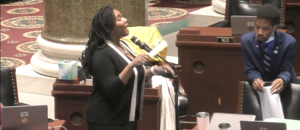Tax breakdowns differ, but there’s some agreement to make Missouri more resilient during recessions

(The Center Square) – Many indicators show Missouri’s recovery from the 2020 pandemic recession was strong and fast. Several influences and circumstances contributed to the swift and widespread comeback, including billions of federal dollars.
But is the state prepared for the next recession, one without significant federal assistance?
A report from two analysts from the Show-Me Institute recommends several tax and policy changes to help state and local governments be better prepared for the next recession. The leader of the Missouri Budget Project agrees with one recommendation, but said there are no easy solutions to complex tax problems.
“Making Missouri Resilient: Assessing State and Local Government Recession and Preparedness” was written by Corianna Baier, an analyst, and Elias Tsapelas, a senior analyst at the Show-Me Institute.
Federal stimulus money and increased federal unemployment benefits helped millions of Missourians continue to pay rent, mortgages and household living expenses during the pandemic recession. People also continued to pay sales, property and income taxes.
“With all of that extra money added in, it’s hard to say what the effects of the actual recession were on state finances,” Baier said. “But in the future, we can’t depend on the federal government giving out that sort of financing. It was unprecedented. And it wouldn’t be smart bookkeeping to depend on it in the future.”
The report referenced Missouri’s rank of 47th in recession preparedness in Moody’s 50-state analysis, published last April and based on fiscal 2019 revenues.
The report recommends increasing property taxes and lowering income taxes at the local level. It suggests increasing sales taxes and lowering income taxes at the state level.
“During economic downturns (and especially during an economic shutdown), income taxes fall as people lose their jobs,” the report states. “In response to a loss of employment, people tend to reduce spending, though less than dollar-for-dollar with lost earnings because of savings and credit. Even so, sales taxes can still tumble during a recession. By contrast, property tax revenues depend on property value assessments, which occur at a lag. In addition, decisions related to property tend to be less elastic and are more resistant to change than decisions that affect sales tax collections. Moreover, in the case of many recessions outside the unique 2007–09 housing crisis, house prices may not fall much at all in dollar terms, leading to very stable property tax revenues.”
Baier said tax cuts should accompany property or sales tax increases.
“Even though that might mean paying more in those taxes, it would normally mean less in paying other forms of taxes,” Baier said. “In the end, you have a more steady and resilient revenue stream for recessions in the future.”
Amy Blouin, president and chief executive officer of the nonprofit Missouri Budget Project, said working to improve resiliency during recessions is worthwhile, but examining the impact of increasing or cutting taxes is essential.
“The most important thing in terms of addressing volatility is to not put all of your eggs in one basket,” Blouin said. “They all have some volatility, but the income tax has proven to have a little bit more elasticity than the other taxes. As the economy grows, it grows. With sales taxes, it takes longer to catch up.”
Blouin said government services are imperative during all phases of economic cycles and there are few easy solutions to achieve tax fairness.
“I think in some instances, people are looking for a silver bullet and it just doesn’t exist,” Blouin said. “The thing we see that drives economic growth is investing in an educated workforce, safe and well-maintained roads, healthy communities and public safety. They all require the government to step in. Through the tax structure, we can fund those critical services that actually drive the economy.”
The report also recommends reducing Missouri’s tax-credit programs, worth about $500 million annually.
“If you stop the preferential treatment provided by Missouri – outpacing most of the country – by getting rid of tax credits, you could lower taxes,” said Tsapelas. “Those aren’t decisions left to Missouri taxpayers. Those are for special interests reaping the benefits.”
Blouin agrees with the report’s recommendation to recreate the state’s Budget Reserve Fund, or rainy-day fund.
“I agree that starting from scratch is probably the best way to go,” Blouin said. “It’s a lot easier than trying to do something with a constitutional amendment.”
The report says the fund’s balance is too low to stabilize the budget, it’s too hard to access and too difficult to repay.
“There’s going to be a much bigger need for money when times are bad just because of how much the cost of Medicaid could go up,” Tsapelas said. “The legislature needs to start thinking about how they are going to address that. There are a few different routes it can take, but it is something that is going to be important going forward.”
Blouin said improving taxation will require significant time and effort.
“It’s going to take many years of educating lawmakers and helping them understand the importance of it,” Blouin said. “But, we can always hope that there will be change, right? There were some significant changes during this year’s legislative session that we’ve been working on for years.”
Disclaimer: This content is distributed by The Center Square
